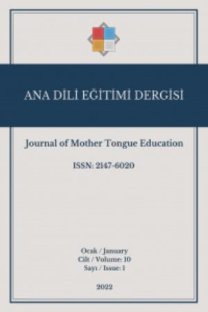Yabancılara Türkçe Öğretimindeki Ders Kitaplarındaki Okuma Metinlerinin Bilgi Türleri Açısından İncelenmesi ( İstanbul C1/+ Örneği)
Examination of Reading Texts in Terms of Types of Information in Turkish as a Foreign Language Course Books (Example of İstanbul C1/+ Course Book)
___
- Akarsu, B. (1998). Dil-Kültür Bağlantısı, İnkılap Kitabevi, İstanbul.
- Bolay, S. H. (2007). Felsefeye Giriş. Ankara: Akçağ Yayınları.
- Cevizci, A. (2010). Bilgi Felsefesi. İstanbul: Say Yayınları.
- Çüçen, A. K. (2009). Bilgi Felsefesi. Bursa: Asa Kitabevi.
- Kaptan, S. (1998). Bilimsel Araştırma ve İstatistik Teknikleri, Ankara: Tekışık Yay.
- Karasar, N. (2005). Bilimsel Araştırma Yöntemleri. Ankara: Nobel Yayınevi.
- Onan, B. ve Arısoy, M.A. (2013). Türkçe öğretiminde epistemolojik bir yaklaşım, Ana Dili Eğitimi Dergisi, 1(1), 77-91.
- Onan, B. (2013). Dil Eğitiminin Temel Kavramları. Ankara: Nobel Yayınevi.
- Öner, N. (1998). "Bir Bilgi Türü Olarak Din". Felsefe Dünyası Sayı: 29
- Tunalı, İ. (2009). Felsefeye Giriş. İstanbul: Altın Kitaplar Yayınevi.
- Yaylı, D. ve Bayyurt, Y. (Ed.) (2014). Yabancılara Türkçe Öğretimi: Politika, Yöntem ve Beceriler. Anı Yayıncılık, Ankara.
- ISSN: 2147-6020
- Yayın Aralığı: Yılda 4 Sayı
- Başlangıç: 2013
- Yayıncı: Mehmet Kurudayıoğlu
Naki Tezel'in Türk Masalları Adlı Kitabının Değerler Açısından Analizi
Tekrarlama ve Sunum Türünün Semantik Bellekte Almanca Sözcüklerin Kodlanmasına Etkisi
İBRAHİM AND UYANIK, HAMİT COŞKUN, YUNUS UĞUR, ABDULLAH DURAKOĞLU
ESRA NUR TİRYAKİ, Seyit Ömer DOĞAN
EBA'nın Türkçe Dersi Öğrenme Alanlarını Karşılama Yeterliliğine Yönelik Öğretmen Görüşleri
Hikâye Kartlarının Çocukların Görsel İfade Becerileri Üzerindeki Etkisi
AHMET AKÇAY, NİLÜFER OKUR AKÇAY
MUSTAFA ONUR KAN, Fülya YEŞİLOĞLU
"Yaratıcı Dramayla Kitap Kurdu Olunur mu?" Çocuk Kitaplarıyla Okuma Sevgisi ve İlgisi Kazandırma
FERAH BURGUL ADIGÜZEL, Gökhan SÜSLÜ
Türkçe Öğretmeni Adaylarının Dünya Edebiyatını Takip Etme Düzeyleri
EBA'nın Türkçe Dersi Öğrenme Alanlarını Karşılama Yeterliliğine Yönelik Öğretmen Görüşleri
